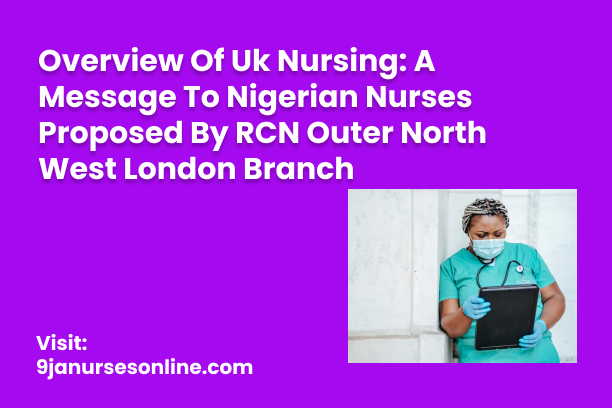in this article, you’re going to read about the OVERVIEW OF UK NURSING: A MESSAGE TO NIGERIAN NURSES PROPOSED BY RCN OUTER NORTH WEST LONDON BRANCH
OVERVIEW OF UK NURSING: A MESSAGE TO NIGERIAN NURSES PROPOSED BY RCN OUTER NORTH WEST LONDON BRANCH
Nursing is one of the largest professions in the world. When asked about nursing most will discuss providing care either physical, psychological or social. Rarely does the discussion take account of the impact that politics has on that ability to care. The notion that safeguarding evidence-based, safe, effective care includes being politically astute, to local needs and national decisions on care provision is seldom mentioned. This is equally relevant when considering global politics and its impact on health inequalities. It is also important to acknowledge that this is not just about the registered nursing and midwifery workforce but includes all those who work in nursing support roles.
There is a misconception that care and politics do not mix. An essential nursing skill is to understand how local and national politics impacts on commissioning, care provision and delivery, and evaluation of that service. Political advocacy and understanding how health politics can impact on an individual’s care experience is not always seen as part of the nursing role and education is key to enabling this.

The nursing profession needs to understand how it can lobby for legislative change, and how embedded legislation can enhance care. Fancourt (2019) provides tips on how to engage with politicians, which is a useful starting point. When asked, nursing colleagues may state fear of speaking out, not being able to articulate concerns, apathy or a lack of understanding that this is part of their role. A feeling of powerlessness or a perceived ethical conflict between caring and politics are also cited, and so nurses remain silent.
Nursing needs to be more politically perceptive. Gender role norms and outdated ideas about engagement by some communities in politics can adversely affect the understanding of how much power and influence nursing can have on care provision.
This is evident in recent events where concerns have been raised about engagement and access to leadership identified by some BAME communities. Generally, when speaking about politics the link to leadership is apparent, however it is important to acknowledge that leadership is not just about those in charge of services, it should be part of nursing life. It must be embedded in pre-registration education, learning and development curriculums, and start early so that children appreciate and understand the importance of engaging in politics and political debate. By working together and having a common understanding of how politics can be used to influence and shape care is imperative. Interestingly 26 candidates for the general election in 2019 had a nursing background (Mitchell, 2019), which may suggest nursing adds value to politics.
In Northern Ireland, the RCN runs a political influencing programme designed to build the confidence of members in influencing, as well as equip them with the skills, support and information required to do so. The programme covers different ways in which nursing can influence and includes delivering an influencing activity. In addition, members participate in broader political influencing activities through attendance at party conferences, meetings with politicians, and providing evidence to the Northern Ireland Assembly Committee for Health.
READ ALSO: How to migrate to the UK as a Nurse from Nigeria – 9ja (Naija) Nurses
In Wales, members, the RCN Wales Nurse of the Year Alumni Network, and Fellows of the RCN participate in political influencing. RCN Wales runs a Political Leadership programme which helps in understanding the influence of politics in health and social care. It supports members to influence change in health and social care policy, develop strategies to shape policy and understand the legislative and policy context of devolution. RCN Wales also delivers teaching sessions to pre-registration nursing students and organisations where politics, policy, practice and influencing form key parts of a curriculum to enhance political engagement.
In Scotland, the RCN connects members directly with its policy and political work through informal liaison and membership of expert reference groups, which are convened to advise on policy and, where appropriate, support members to sit on various external policy groups, appear before the Scottish Parliament or in the media on behalf of RCN Scotland.
The RCN also runs a systems leadership programme which provides an opportunity for senior nursing managers to develop skills in influencing and implementing changes to policy and practice in the workplace.
CLICK HERE TO DOWNLOAD OUR APP
The NMC is clear about the need for all registrants to provide leadership in their role (Nursing and Midwifery Council, 2018), including being able to articulate concerns about service provision and political decisions that may have an adverse impact on that provision. Nursing is one of the most trusted professions, and equipped with the skills to actively engage locally and nationally, it’s ideally positioned to influence the future of health and social care across the UK. Fancourt (2019).
Writter: Nr Danladi Aminu




2 Comments
Thank you for your sharing. I am worried that I lack creative ideas. It is your article that makes me full of hope. Thank you. But, I have a question, can you help me?
Thank you for your sharing. I am worried that I lack creative ideas. It is your article that makes me full of hope. Thank you. But, I have a question, can you help me?